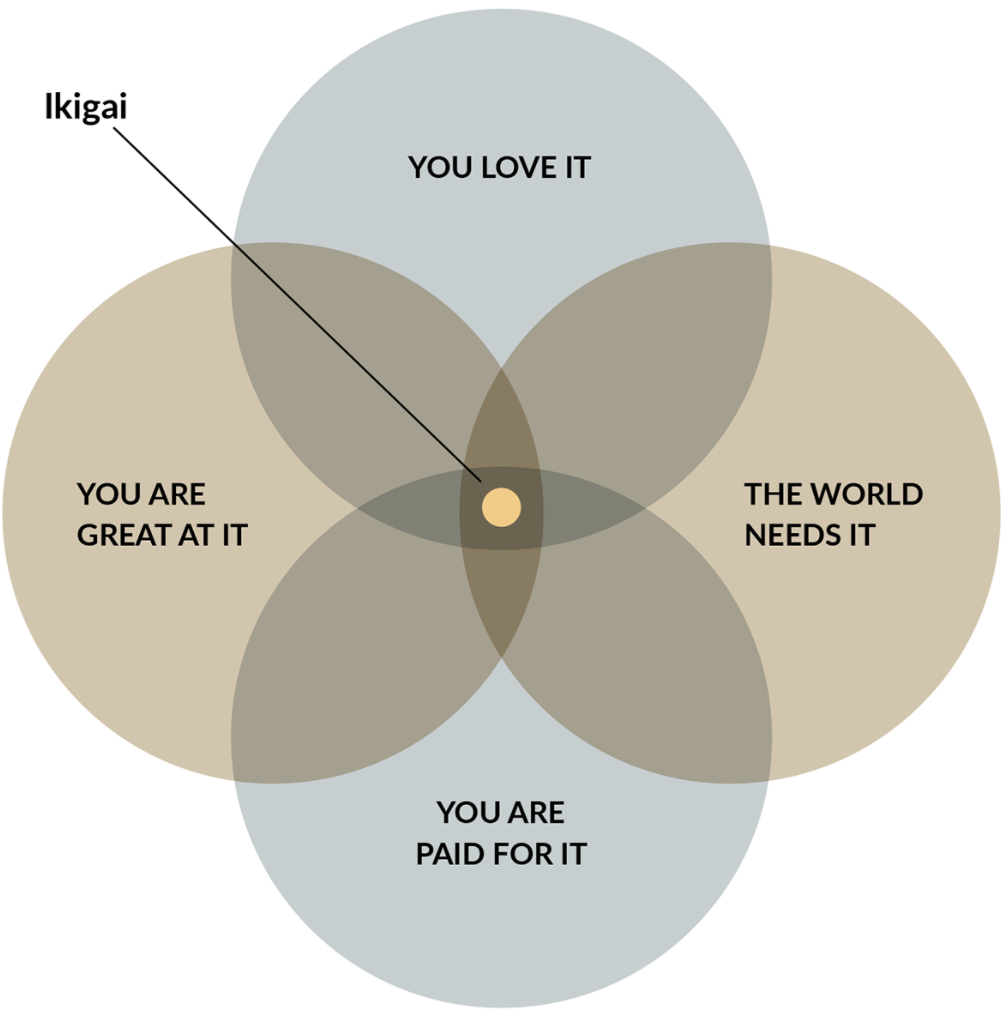Today, we’re going to delve into the fascinating world of ikigai, a Japanese philosophy that centers around finding purpose and fulfillment in life.
Ikigai, which translates to “reason for being,” is a concept that has been gaining popularity in recent years, as more and more people seek to understand the meaning and purpose of their lives.
So, without further ado, let’s dive in and discover the power of ikigai!
The Oxford English Dictionary defines Ikigai as “a motivating force; something or someone that gives a person a sense of purpose or a reason for living”. More generally it may refer to something that brings pleasure or fulfillment.
According to the Japanese, everyone has an ikigai (a reason for living). And according to the residents of the Japanese village with the world’s longest-living people, finding it is the key to a happier and longer life.
It’s important to mention that while traditional Japanese philosophy focuses on finding your bliss, western interpretation has used ikigai as a method of finding your dream career.
Having a strong sense of ikigai means that each day is infused with meaning. It’s the reason we get up in the morning.
It’s also the reason many Japanese never really retire (in fact there’s no word in Japanese that means retire in the sense it does in English): they remain active and work at what they enjoy, because they’ve found a real purpose in life, with the happiness of always being busy.
It’s often represented by a Venn diagram with four circles: what you love, what you’re good at, what the world needs, and what you can be paid for.
Finding something that overlaps in all four circles is considered to be your ikigai, or your reason for being.
Ikigai for What?
It’s a way to find meaning and fulfilment in your life and to live a life that feels truly worthwhile.

Japan is ranked second in the world for life expectancy, with women expected to live 88.09 years and men expected to live 81.91 years.
While it’s true that diet plays a role, many Japanese people believe ikigai has a lot to do with their longevity and living a happy life.
It’s becoming popular with younger generations both in and out of Japan who are interested in having meaningful work lives.
Because who doesn’t want to find happiness every day?
Ready to level up your content experience? Meet Reader: the game-changer you’ve been waiting for, organizing your reading and remembering what you read! Sign up now using my link and get 60 FREE days!
I am incredibly grateful that you have taken the time to read this post.
Support my work by sharing my content with your network using the sharing buttons below.
Want to show your support and appreciation tangibly?
Creating these posts takes time, effort, and lots of coffee—but it’s totally worth it!
If you’d like to show some support and help keep me stay energized for the next one, buying me a virtual coffee is a simple (and friendly!) way to do it.
Do you want to get new content in your Email?
Do you want to check previous Explaining articles? Check these from the last couple of weeks:
- Explaining: The Project Management Institute (PMI)
- Explaining: Personal Branding
- Explaining: The Habit Loop
- Explaining: The Plateau Effect
- Explaining: Rapid Application Development (RAD)
- Explaining: Theory of Constraints (TOC)
- Explaining: Balanced Scorecard (BSC)
- Explaining: Business Model Canvas
- Explaining: Nonviolent Communication
- Explaining: Dynamic Systems Development Method (DSDM)
Check also my latest Book Notes:
- Book Notes #127: The Laws of Simplicity by John Maeda
- Book Notes #126: Inevitable by Mike Colias
- Book Notes #125: Revenge of the Tipping Point by Malcolm Gladwell
- Book Notes #124: Radical Candor by Kim Scott
- Book Notes #123: The Personal MBA by Josh Kaufman
- Book Notes #122: The First 20 Hours by Josh Kaufman
- Book Notes #121: A World Without Email by Cal Newport
- Book Notes #120: Storynomics by Robert McKee and Thomas Gerace
- Book Notes #119: Getting Things Done by David Allen
- Book Notes #118: Supercommunicators by Charles Duhigg
Check my main categories of content below:
- Articles
- Book Notes
- Career Development
- Explaining
- Leadership
- Lean and Agile
- Management
- Personal Development
- Project Management
- Reading Insights
- Technology
Navigate between the many topics covered in this website:
Agile Agile Coaching Agile Transformation Art Artificial Intelligence Blockchain Books Business Business Tales C-Suite Career Coaching Communication Creativity Culture Cybersecurity Decision Making Design DevOps Digital Transformation Economy Emotional Intelligence ESG Feedback Finance Flow Focus Gaming Generative AI Goals GPT Habits Harvard Health History Innovation Kanban Large Language Models Leadership Lean Learning LeSS Machine Learning Magazine Management Marketing McKinsey Mentorship Metaverse Metrics Mindset Minimalism MIT Motivation Negotiation Networking Neuroscience NFT Ownership Paper Parenting Planning PMBOK PMI PMO Politics Portfolio Management Productivity Products Program Management Project Management Psychological Safety Readings Remote Work Risk Management Routines Scrum Self-Improvement Self-Management Sleep Social Media Startups Strategy Team Building Technology Time Management Volunteering Web3 Work
Support my work by sharing my content with your network using the sharing buttons below.
Want to show your support tangibly? A virtual coffee is a small but nice way to show your appreciation and give me the extra energy to keep crafting valuable content! Pay me a coffee:

